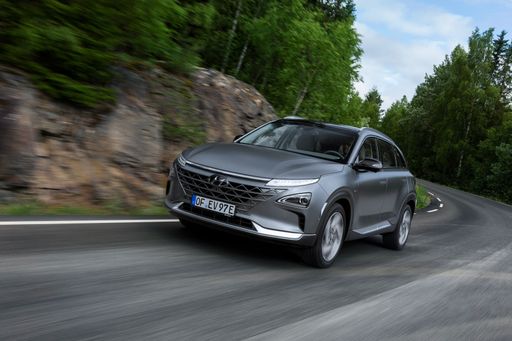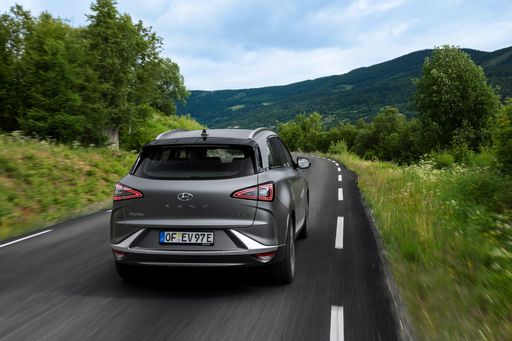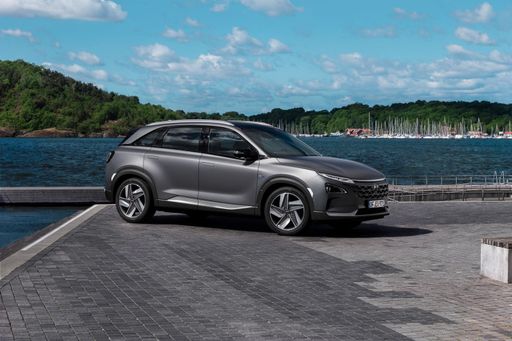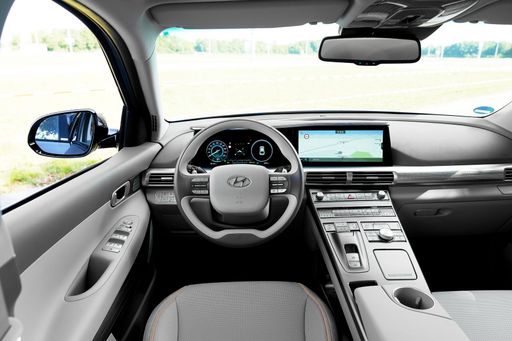Hyundai Nexo VS Toyota Proace Bus – Specs, Efficiency & Price Comparison
Which model is the better choice – the Hyundai Nexo or the Toyota Proace Bus? We compare performance (163 HP vs 177 HP), boot capacity (461 L vs 0 L), efficiency ( vs 24.20 kWh7.30 L), and of course, the price (66400 £ vs 31600 £).
Find out now which car fits your needs better!
The Hyundai Nexo (SUV) is powered by a Hydrogen engine and comes with a Automatic transmission. In comparison, the Toyota Proace Bus (Bus) features a Electric or Diesel engine and a Automatic or Manuel gearbox.
When it comes to boot capacity, the Hyundai Nexo offers 461 L, while the Toyota Proace Bus provides 0 L – depending on what matters most to you. If you’re looking for more power, you’ll need to decide whether the 163 HP of the Hyundai Nexo or the 177 HP of the Toyota Proace Bus suits your needs better.
There are also differences in efficiency: vs 24.20 kWh7.30 L. In terms of price, the Hyundai Nexo starts at 66400 £, while the Toyota Proace Bus is available from 31600 £.
Compare all the key specs now and find out which model fits your lifestyle best!
Hyundai Nexo
The Hyundai Nexo stands out in the automotive world as a pioneering hydrogen fuel cell vehicle, offering an eco-friendly alternative to conventional engines. Its sleek design combines modern aesthetics with advanced technology, providing a comfortable and futuristic driving experience. The Nexo not only represents a significant step towards sustainable motoring but also impresses with its smooth and silent performance on the road.
details @ hyundai.news
@ hyundai.news
 @ hyundai.news
@ hyundai.news
 @ hyundai.news
@ hyundai.news
 @ hyundai.news
@ hyundai.news
Toyota Proace Bus
The Toyota Proace Bus offers a versatile and practical solution for those in need of spacious passenger transport combined with a touch of comfort. Its interior is designed to maximise seating capacity while ensuring that both driver and passengers can enjoy a pleasant journey. With its efficient engine options and reliable build quality, this vehicle remains a popular choice for families and businesses alike.
details

|
|
|
|
|
Costs and Consumption |
|
|---|---|
|
Price
66400 - 71000 £
|
Price
31600 - 61800 £
|
|
Consumption L/100km
-
|
Consumption L/100km
7.3 - 7.4 L
|
|
Consumption kWh/100km
-
|
Consumption kWh/100km
24.2 - 24.4 kWh
|
|
Electric Range
666 km
|
Electric Range
218 - 343 km
|
|
Battery Capacity
-
|
Battery Capacity
-
|
|
co2
0 g/km
|
co2
0 - 193 g/km
|
|
Fuel tank capacity
6 L
|
Fuel tank capacity
69 L
|
Dimensions and Body |
|
|---|---|
|
Body Type
SUV
|
Body Type
Bus
|
|
Seats
5
|
Seats
5 - 9
|
|
Doors
5
|
Doors
4 - 5
|
|
Curb weight
1889 kg
|
Curb weight
1835 - 2140 kg
|
|
Trunk capacity
461 L
|
Trunk capacity
0 L
|
|
Length
4670 mm
|
Length
4983 - 5333 mm
|
|
Width
1860 mm
|
Width
1920 mm
|
|
Height
1630 mm
|
Height
1890 mm
|
|
Payload
451 kg
|
Payload
825 - 1265 kg
|
Engine and Performance |
|
|---|---|
|
Engine Type
Hydrogen
|
Engine Type
Electric, Diesel
|
|
Transmission
Automatic
|
Transmission
Automatic, Manuel
|
|
Transmission Detail
Reduction Gearbox
|
Transmission Detail
Schaltgetriebe, Automatikgetriebe
|
|
Drive Type
Front-Wheel Drive
|
Drive Type
Front-Wheel Drive
|
|
Power HP
163 HP
|
Power HP
136 - 177 HP
|
|
Acceleration 0-100km/h
9.2 - 9.5 s
|
Acceleration 0-100km/h
13.30 s
|
|
Max Speed
177 - 179 km/h
|
Max Speed
130 - 170 km/h
|
|
Torque
395 Nm
|
Torque
260 - 400 Nm
|
|
Number of Cylinders
-
|
Number of Cylinders
4
|
|
Power kW
120 kW
|
Power kW
100 - 130 kW
|
|
Engine capacity
-
|
Engine capacity
1997 cm3
|
General |
|
|---|---|
|
Model Year
2018 - 2021
|
Model Year
2024 - 2025
|
|
CO2 Efficiency Class
A
|
CO2 Efficiency Class
A, G
|
|
Brand
Hyundai
|
Brand
Toyota
|
Hyundai Nexo
Introducing the Hyundai Nexo: A Step into the Future of Automobiles
The Hyundai Nexo represents a groundbreaking stride in the realm of hydrogen-powered vehicles, aligning cutting-edge technology with environmental sustainability. As an SUV, it offers an impressive blend of performance, efficiency, and style, challenging the conventional norms of automotive engineering.
Advanced Hydrogen Technology
At the heart of the Hyundai Nexo's innovation is its hydrogen fuel cell powertrain, a marvel that enables the vehicle to achieve zero CO2 emissions, boasting a remarkable CO2-Effizienzklasse of A. This SUV offers the dual advantages of an eco-friendly footprint with the substantial performance of a traditional combustion engine.
Impressive Performance Metrics
Equipped with a robust 120 kW (163 PS) motor, the Nexo can accelerate from 0 to 100 km/h in a commendable span of 9.2 to 9.5 seconds. This makes the Nexo not just a green choice but also a viable option for those who value brisk acceleration and dynamic driving capabilities. Furthermore, the vehicle manages a top speed of 177 to 179 km/h, showcasing its ability to hold its own on motorways.
Efficient Design and Spacious Comfort
The Nexo’s dimensions, at 4670 mm in length, 1860 mm in width, and 1630 mm in height, underline its role as a spacious and practical SUV. Inside, it comfortably seats up to five occupants, ensuring a luxurious ride experience complemented by its 461-litre boot capacity, ideal for both daily commutes and longer journeys.
State-of-the-Art Features
Hyundai's commitment to excellence is evident in the Nexo’s suite of advanced features. The Prime-Paket trim offers sophistication and practicality, integrating seamless technology with high-quality materials that redefine interior comfort and style. Despite its avant-garde hydrogen technology, Hyundai hasn't compromised on the intuitive user experience.
Cost and Efficiency Analysis
With monthly running costs between €1680 and €1786 and variable costs per kilometre from 67.2 to 71.5 cents, the Hyundai Nexo is an investment in future-oriented automotive excellence. Its distinctive lack of CO2 emissions assures potential owners of its sustainability, while its running costs reflect the premium nature of its innovative technology.
Conclusion: The Future is Hydrogen
The Hyundai Nexo serves as a testament to the potential of hydrogen as a mainstream fuel source. By offering leading-edge technology, notable performance, and unbeatable efficiency, the Nexo positions itself as a beacon of future mobility. For those ready to embrace the next chapter of automotive evolution, the Nexo awaits as a stellar option.
Toyota Proace Bus
The Versatile Companion: Toyota Proace Bus
The Toyota Proace Bus stands out in the competitive MPV segment, offering a blend of practicality, efficiency, and innovative technology. Toyota has crafted this vehicle to cater to a wide array of needs, whether it be family outings, business transport, or electric motoring. Let's delve into the technical details and innovations that make the Toyota Proace Bus a compelling choice.
Engineering Excellence: Diesel and Electric Variants
The Proace Bus provides several powertrain options to meet diverse requirements. Customers can choose between robust diesel engines or an innovative electric drive system. Diesel variants feature a 2.0 D-4D engine available in various outputs, from 144 PS to 177 PS, supporting both manual and automatic gear options. The diesel engines deliver a balanced performance, with fuel consumption ranging between 7.3 to 7.4 L/100km.
On the electric front, the Proace Electric offers an enticing prospect for eco-conscious drivers. Equipped with a battery capacity of up to 75 kWh, this variant ensures a respectable range of up to 343 km on a single charge, while consuming between 24.2 to 24.4 kWh/100 km. The electric model delivers 136 PS, making it ideal for smooth urban driving.
Interior Innovation: Comfort Meets Functionality
The Toyota Proace Bus impresses with its versatile interior, accommodating 5 to 9 passengers comfortably. Various seating configurations are available depending on the version and needs, making it a perfect solution for both large families and shuttle services. Modern technology adorns the cabin, with a focus on comfort and connectivity, ensuring all passengers travel in style and enjoy seamless connectivity options.
Safety Features and Driver Assistance Technologies
Safety is paramount in the Proace Bus, featuring a plethora of driver assistance systems designed to protect both passengers and pedestrians. Advanced features include parking assistance, lane departure warning, and adaptive cruise control, providing peace of mind during long journeys.
Efficiency and Environmental Considerations
Balancing performance with environmental responsibility, the Proace Bus range includes models that meet various CO2 efficiency classes from A to G. The electric variant notably achieves zero CO2 emissions, making it an excellent choice for sustainable mobility. Furthermore, innovations in aerodynamics and weight management contribute to the Proace Bus's commendable efficiency metrics.
Conclusion: A Dynamic Choice for Modern Needs
The Toyota Proace Bus exemplifies Toyota's commitment to versatility, efficiency, and innovation. With its broad range of engine options, seating configurations, and state-of-the-art technologies, it serves multiple purposes while keeping operational costs in check. Whether for family, business, or eco-friendly motoring, the Proace Bus is a formidable contender in today's automotive landscape.
The prices and data displayed are estimates based on German list prices and may vary by country. This information is not legally binding.
